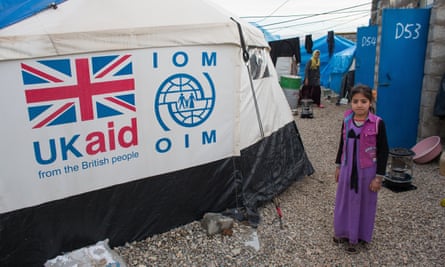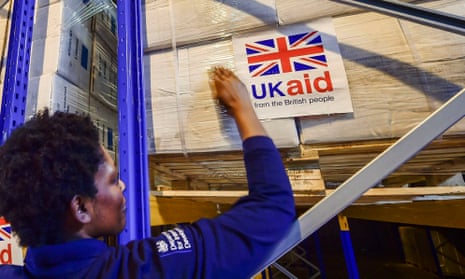The prime minister’s announcement on Tuesday that the Department for International Development (DfID) will be merged with the Foreign and Commonwealth Office (FCO) has been met with widespread anger and disappointment among UK aid charities.
Stephanie Draper, the CEO of Bond, a UK network for international development NGOs, said the announcement on Tuesday, during the coronavirus pandemic, couldn’t have come at a worse time.
“We are facing the biggest global pandemic in our lifetime, and we need a globally respected, independent Department for International Development that has the relevant expertise to ensure Covid-19 is tackled worldwide, as well as a secretary of state for international development able to champion the needs of the world’s poorest people in our global response.
“Scrapping DfID now puts the international response to Covid-19 in jeopardy and, at a time when we need global cooperation, risks a resurgence of the disease both abroad and here in the UK.”
She added that keeping an independent DfID is the best way to ensure aid is spent on “helping those most in need, delivers impact for the British taxpayer and remains untied to our political interests”.
“Yet today, without any process or consultation, and against the recommendations of both independent aid scrutiny bodies as well as the UK’s development and humanitarian sector, the government has decided to put our aid budget in the hands of those will little expertise in global health systems, humanitarian response and disease prevention and eradication.
“Make no mistake, this decision will do nothing but hurt the world’s poorest and most vulnerable people.”
Romilly Greenhill, the UK director of the advocacy group ONE, said the merger was the wrong decision and “is a loss for global Britain and the world’s poorest people”.
“It’s perplexing that the government chose the middle of a global pandemic to merge these two departments.
“DfID is recognised internationally for its expertise in making the world a healthier, safer and more prosperous place. Abolishing it will harm us all. Time and again it’s been shown that the FCO does not have the experience or capacity to do this well.”
She added: “This is not the right decision if Britain is to truly be a global player in addressing challenges such as Covid-19. A global pandemic requires a global response – driven by those with real expertise in fighting disease and extreme poverty. Capitals around the world will be dismayed that the UK appears to be stepping back from global leadership at the very moment it is needed most.”
Mark Sheard, the CEO of World Vision UK, said the announcement was “shocking evidence of the UK putting its own economic interests above saving lives”.
“The terrible irony is that global Britain has today shrunk following years of an anti-aid agenda taking root at the heart of government.
“While cross-governmental coordination is absolutely necessary, this should not be done at the expense of aid quality, for which the world’s poorest will pay the price. It has already been warned that Covid-19 could set back global poverty levels by 30 years. The end of an independent DfID will drive us even further backwards.”
He added that giving the foreign secretary oversight of aid would mean less transparency, effectiveness and accountability, “and risk money being diverted to address UK foreign policy interests rather than alleviating poverty”.
“Diverting funds from the world’s poorest communities under the guise of taking back control in the UK would be a dereliction of our responsibility as a nation.”
Sheard said he was “deeply concerned” about what will constitute aid under this new department – the Foreign, Commonwealth the Development Office – which is expected to be formed in September. “The definition of aid must not be diluted, and it must not become a weapon of foreign policy.”
Danny Harvey, the executive director of Concern Worldwide (UK), meanwhile, said the merger “sends a worrying signal that the eradication of poverty is no longer the primary aim of UK aid”.
“By fusing aid with the national interest, we risk leaving the most vulnerable behind and undermining some of the great progress that has been made. Established 23 years ago, DfID is widely respected and consistently outstrips the FCO in independent reviews for both transparency and aid impact. DfID has championed development initiatives on gender equality, health, nutrition, education and building resilience to climate change,” she said.
“As the number of people facing severe food insecurity is set to double this year due to the pandemic, this is not the time for the UK to renege on our values of compassion and common humanity. Maintaining an independent DfID is the best way to ensure UK aid goes to helping the most vulnerable communities to survive and recover from Covid-19.”

Patrick Watt, Christian Aid’s director of policy, public affairs and campaigns, called the merger “an act of political vandalism”.
“Stripping the Department for International Development of its independence and folding it into the Foreign and Commonwealth Office threatens a double whammy to people in poverty, and to our standing in the world.”
He said without an independent DfID, the UK’s ability to help tackle poverty, and the impacts of the climate crisis and conflict, will be reduced. “The UK has a moral responsibility towards the world’s poorest.”
Daniel Willis, campaign manager for Global Justice Now, was blunter. He said the merger was “a terrible decision that takes us back two decades to when UK aid was subservient to the interests of British business”.
“It’s bad news for the fight against global poverty, and good news for suppliers of corporate drinks parties in foreign embassies,” he said.
“No-one who believes that UK aid can have a positive impact in the world thinks this is a good idea. Just last week, MPs urged the government to abandon this merger on the grounds that it would destroy the effectiveness and transparency of UK aid.”
The merger signalled “a conscious shift to a development model based on a hollowed out state that is forced to rely on corporate partners to function at home and abroad”. He added: “DfID has been far from perfect, but its formal independence from the Foreign Office has offered some protection from aid money being treated as a slush fund for business interests. Now that’s been swept away – Empire 2.0 here we come.”
Kevin Watkins, the chief executive of Save the Children, said the merger was “a flawed decision that flies in the face of commitments made in the government’s manifesto”.
“During the biggest humanitarian crisis in a century, when the Covid-19 pandemic is reversing hard won gains in child and maternal health, education, and poverty, this is a baffling and deeply damaging move. It will weaken the UK’s ability to provide for the world’s poorest children at a time when they need the UK’s support and solidarity.”
Watkins said a cabinet minister for international development must be retained “to ensure that humanitarian considerations are heard at the highest level of government”, and the government must “move immediately” to protect the focus and quality of aid now spent through the Foreign Office.
Sacha Deshmukh, the executive director of Unicef UK, said the merger risked damaging the UK’s international standing.
“The UK’s global leadership on international development, which saves lives every day and is critical to our standing around the world, should not be lost among the broader range of goals that fall under other foreign policy objectives.
“The timing of this merger means particular attention will need to be paid to the vital DfID-funded programmes around the world that are responding to the current crisis and are already facing unprecedented threat and disruption.”
Deshmukh’s words were echoed by the chair of the International Development Committee, Sarah Champion, who feared the merger would jeopardise the UK’s “world-leading” humanitarian work.
“The international development committees review showed it is abundantly clear that DfID is an incredibly strong and well-respected department internationally. DfID offers a vital lifeline for so many people struggling around the world and is well-respected by NGOs on the ground, literally saving lives. We cannot lose sight of why we support other countries with official development assistance; we help children access quality education, we boost healthcare facilities, we ensure people access justice and security.
“DfID’s work considerably increases the UK’s clout on the world stage – amplifying our voice in multilateral organisations and extending our diplomatic influence in country.”
She added: “We have received extensive evidence that merging foreign affairs departments and aid departments erode international reputations, and actually are so costly and disruptive there is very little benefit. In the cases of Canada and Australia, the mergers have not improved the quality of aid, and we have heard that the reorganisations eroded their soft power.
“Merging these departments may seem attractive short-term with possible administrative efficiency gains, but in the long run, we will have shot ourselves in the foot on the world stage.”
